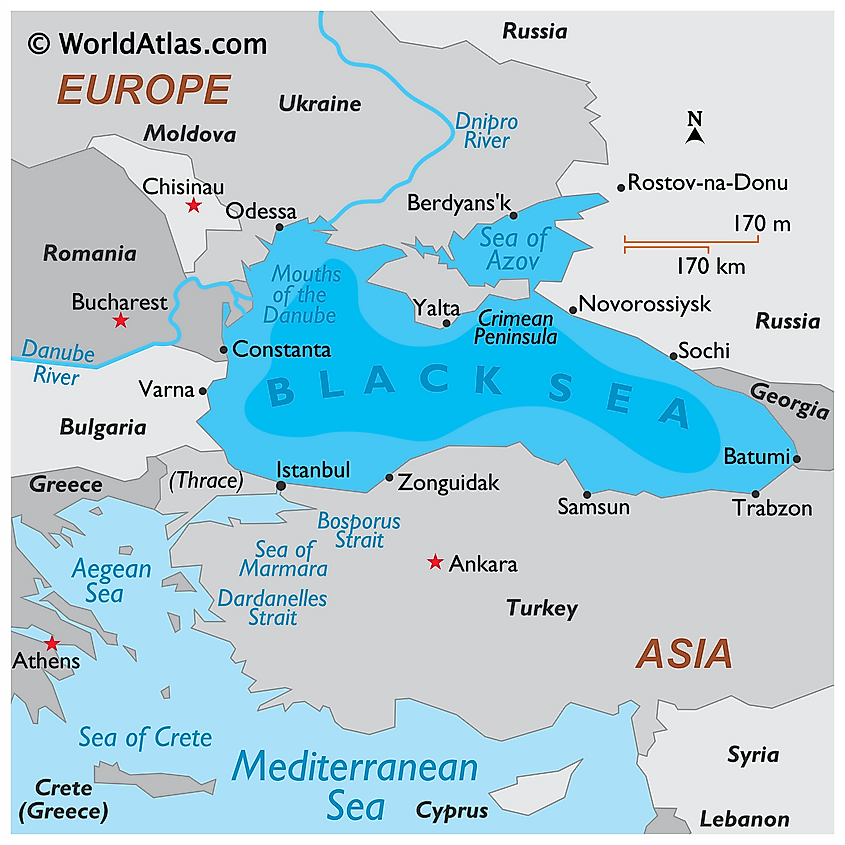Description

Disclaimer: Copyright infringement not intended.
Context
Recent developments in the ongoing conflict between Ukraine and Russia in the Black Sea region.
Details
- Ukraine's sea drones struck a major Russian port, Novorossiysk.
- The attack damaged a Russian warship, Olenegorsky Gornyak, impacting its combat capabilities.
- This marks the first time a commercial Russian port has been targeted in the ongoing conflict.
- Novorossiysk is a significant Black Sea port with naval base, shipbuilding yards, and oil terminal.
- The attack disrupted maritime traffic temporarily, highlighting Kyiv's growing capabilities.
Escalation of Conflict in the Black Sea
- The Black Sea region has become a crucial battleground in the ongoing conflict.
- Fighting intensifies after Moscow's withdrawal from a grain export deal through the waterway.
- Recent attacks include damaging Russian grain facilities and targeting patrol vessels.
- Change in dynamics suggests Ukraine's attempt to challenge Russia's naval control.
Role of Drones
- Mykhailo Podolyak, advisor to the Ukrainian President, emphasizes the impact of drones in changing the conflict dynamics.
- Drones are altering the rules of engagement and diminishing the value of the Russian fleet.
- Drone technology provides Ukraine with a new strategy to challenge Russian naval dominance.
Impact of Grain Deal Termination
- Termination of the grain export deal gives Ukraine more flexibility to take aggressive actions.
- Ships carrying food from Ukrainian ports were previously given safe passage, but this constraint is now lifted.
- Military analyst Roman Svytan predicts an increase in attacks on Russian ships due to this change.
Russia's Naval Control
- Russia's Navy has controlled the seas in the conflict, launching cruise missiles and blockading the Ukrainian coast.
- Frequent missile attacks on ports and cities have been reported.
- Mining the Black Sea has made passage dangerous for other vessels.
Shifting Dynamics
- Ukraine's actions, including the recent drone strike and attacks on Russian vessels, signal an attempt to shift the naval dynamics.
- It indicates a strategic move to challenge Russia's dominance in the Black Sea region.
- The conflict's nature and intensity are evolving as both sides adapt to changing strategies.
Geopolitical Implications
- Developments in the Black Sea conflict have broader geopolitical implications.
- The conflict reflects tensions between Ukraine and Russia, impacting regional stability.
.jpg)
About Black Sea
- The Black Sea is a significant geographical and geopolitical entity located in southeastern Europe, bordered by six countries: Bulgaria, Romania, Ukraine, Russia, Georgia, and Turkey.
- It is characterized by its historical, economic, and strategic importance in the region.
Geographical Features
- The Black Sea is situated between Europe and Asia, with an area of approximately 436,000 square kilometers.
- It is connected to the Mediterranean Sea through the Bosporus Strait, the Sea of Marmara, and the Dardanelles Strait.
- The Black Sea is known for its unique hydrographic properties.
- It is characterized by its limited exchange of water with the Mediterranean, which results in a lower oxygen content in deeper layers, creating anoxic conditions.
- The coastlines of the Black Sea are dotted with numerous ports and cities of historical significance, including Odessa, Istanbul, Varna, and Constanta.
Economic Importance
- The Black Sea has historically been a crucial trade route connecting Europe with Asia.
- It facilitates the movement of goods through major ports, contributing to regional and international trade.
- The Black Sea is believed to possess significant energy resources, including oil and natural gas reserves beneath its seabed.
- Exploration and exploitation of these resources are of economic importance to the countries bordering the sea.
Geopolitical Significance
- The Black Sea region has witnessed the convergence of various civilizations and cultures throughout history. It has been a strategic crossroads for trade, migration, and conflicts.
- The Black Sea has been a focal point for geopolitical tensions, particularly due to Russia's military presence and assertive actions in the region.
- Control over maritime access and security has been a subject of concern for neighboring countries and international actors.
Environmental and Ecological Considerations
- The Black Sea supports a diverse range of marine species, including fish and marine mammals. However, overfishing and pollution have posed threats to its ecological balance.
- Pollution from agricultural runoff, industrial activities, and untreated sewage has led to environmental degradation, including eutrophication and oxygen depletion.
Current Geopolitical Dynamics
- The Black Sea has been a site of geopolitical tensions, particularly between Russia and Ukraine.
- The annexation of Crimea by Russia in 2014 escalated the conflict and led to concerns over security and territorial integrity.
- The control of naval access and trade routes in the Black Sea has implications for regional stability and the balance of power among countries in the region.
- International agreements such as the Montreux Convention govern the passage of ships through the Bosporus and Dardanelles Straits, regulating the naval presence of non-Black Sea states in the region.
|
PRACTICE QUESTION
Q) Discuss the geopolitical significance of the Black Sea region in the context of historical, economic, and security considerations. Analyze the challenges and opportunities posed by the region's unique characteristics and its impact on international relations. (250 words)
|

https://epaper.thehindu.com/ccidist-ws/th/th_delhi/issues/46451/OPS/GMCBIT6R3.1+GCTBIVGSB.1.html










